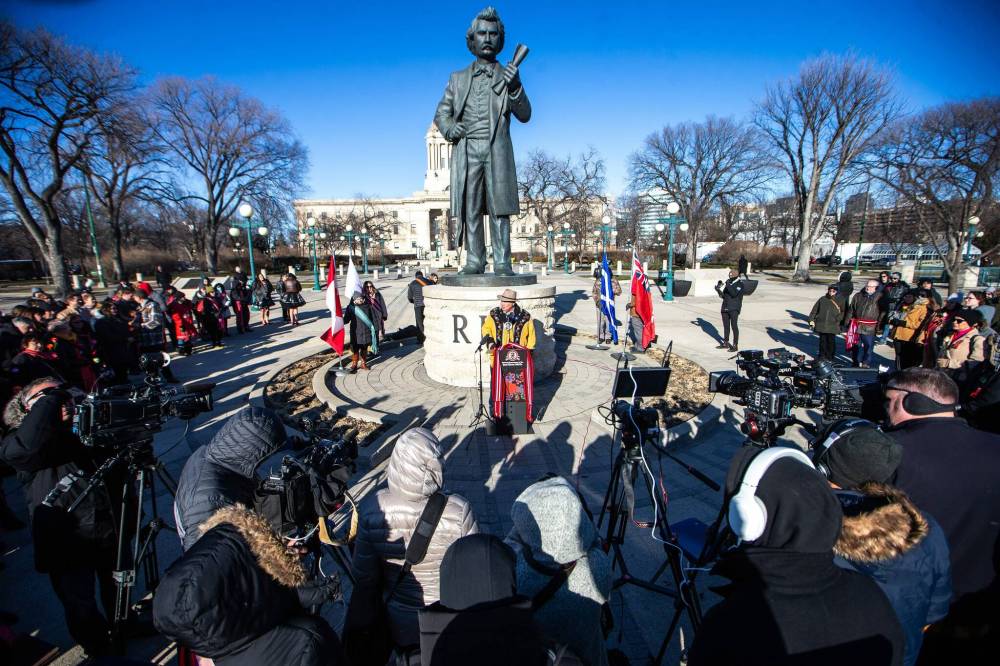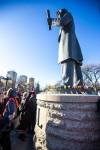Recognition long overdue for Manitoba’s founder, ‘first premier’
Advertisement
Read this article for free:
or
Already have an account? Log in here »
To continue reading, please subscribe:
Monthly Digital Subscription
$0 for the first 4 weeks*
- Enjoy unlimited reading on winnipegfreepress.com
- Read the E-Edition, our digital replica newspaper
- Access News Break, our award-winning app
- Play interactive puzzles
*No charge for 4 weeks then price increases to the regular rate of $19.00 plus GST every four weeks. Offer available to new and qualified returning subscribers only. Cancel any time.
Monthly Digital Subscription
$4.75/week*
- Enjoy unlimited reading on winnipegfreepress.com
- Read the E-Edition, our digital replica newspaper
- Access News Break, our award-winning app
- Play interactive puzzles
*Billed as $19 plus GST every four weeks. Cancel any time.
To continue reading, please subscribe:
Add Free Press access to your Brandon Sun subscription for only an additional
$1 for the first 4 weeks*
*Your next subscription payment will increase by $1.00 and you will be charged $16.99 plus GST for four weeks. After four weeks, your payment will increase to $23.99 plus GST every four weeks.
Read unlimited articles for free today:
or
Already have an account? Log in here »
Hey there, time traveller!
This article was published 28/11/2023 (740 days ago), so information in it may no longer be current.
Manitoba does a poor job of sorting out who its first premiers were. The province did not have a premier until 1874, almost four years after it joined Canada. Yet the Province of Manitoba, and other “official” sources, list three people as having held the title from 1870 to 1874. It’s a curious historical inaccuracy.
“Manitoba became a province in 1870, but it did not have a premier until 1874,” Winnipeg historian and author David Burley writes in the book Manitoba’s Premiers of the 19th and 20th Centuries.
Burley accurately explains that the province did not have a premier until Manitoba’s second lieutenant-governor Alexander Morris invited Marc-Amable Girard, a French Canadian from Quebec, to form a cabinet in July 1874. It marked the moment when Manitoba was granted full responsible government.

MIKAELA MACKENZIE / WINNIPEG FREE PRESS FILES
Last week the NDP government introduced a bill to recognize Métis leader Louis Riel as the “honorary” first premier of Manitoba.In its first 3 ½ years, the Manitoba government was run by a federally appointed lieutenant-governor. There was an elected legislative assembly, but cabinet was appointed and controlled by the Crown’s representative.
That changed in 1874 when Girard became the first premier of Manitoba. In a letter written to R.W. Scott, Canada’s secretary of state for the provinces, Morris explained that by inviting Girard to form a cabinet, responsible government was introduced “in its modern type” in Manitoba.
“The previous ministry was selected personally by my predecessor and none of its members were recognized as first premier,” wrote Morris on July 13, 1874.
So why does the province continue to perpetuate the historical inaccuracy that Manitoba had premiers prior to 1874? It has never offered a satisfactory answer to that question.
Officially, the Province of Manitoba lists Alfred Boyd as the first premier, even though he was not the premier. He was appointed provincial secretary by Adams Archibald (the province’s first lieutenant-governor) in 1870, before Manitoba’s first election in December of that year. Fortunately, Boyd won a seat in that election, so he was at least an “elected” appointed minister.
Girard is listed as the second premier after Boyd, even though he was not the premier until 1874.
Henry Clarke is listed, wrongly, as the third premier from March 1872 to July 1874.
Portraits of these so-called premiers hang in a committee room at the Manitoba legislature and they are identified as premiers in the Speaker’s photo gallery located on the first-floor hallway of the building.
From time to time, official sources add an asterisk to the names of Boyd, Girard and Clarke and point out they were not really premiers, but rather provincial secretaries or chief ministers. Yet they are still regarded as having served as premiers of the province.
NDP Premier Wab Kinew was sworn in as Manitoba’s “25th premier” last month. In reality, he is the 23rd premier since neither Boyd nor Clarke were premiers.
Which brings us to Métis leader Louis Riel. Last week the NDP government introduced a bill to recognize Riel as the “honorary” first premier of Manitoba. The term honorary in the bill is deliberate since Riel was never a Manitoba premier, much less the first one.
The Métis leader was definitely the founder of Manitoba. He ensured Manitoba entered Canada as a province with an elected legislative assembly (not the territory Canada sought at the time). He also fought to ensure the land, linguistic and cultural rights of the Métis and others living in the Red River Settlement were protected through the Manitoba Act, the federal legislation passed by Parliament in May 1870. But he was never a premier.
Riel was the leader of two provisional governments during the Red River Resistance. He led an armed militia that blocked lieutenant-governor designate William McDougall from entering the settlement, took possession of the Hudson’s Bay Company’s headquarters at Upper Fort Garry (corner of Broadway and Main Street) and jailed dozens of political opponents to maintain control of the settlement.
Riel led the first provisional government in the winter of 1869-70 and the second after the creation of the Convention of Forty that followed two historic, mass outdoor public meetings at Upper Fort Garry. The Métis leader was elected president of the Legislative Assembly of Assiniboia in the months before Manitoba officially joined Canada in July 1870.
When the Wolseley expedition arrived in late August of that year (the military force sent by Ottawa to ostensibly maintain peace, but whose volunteer soldiers committed repeated acts of violence against many members of the Métis community), the provisional government disbanded and Riel fled, fearing for his life. Nine days later, Archibald arrived and began the task of assembling Manitoba’s first provincial government.
Riel was not a premier, but bestowing the honorary title on him is appropriate and important. It officially recognizes the Métis leader for who he was: the founder of Manitoba. Without him, scores of Métis and others would have been unable to run for elected office in Manitoba’s early years, including the English-speaking Métis John Norquay, Manitoba’s first Indigenous premier (1878 to 1887). Without Riel, Métis rights would not be enshrined in Canada’s Constitution.
Louis Riel is the most important leader Manitoba has ever had. The honorary title is an important recognition of that historical fact.
tom.brodbeck@freepress.mb.ca

Tom Brodbeck is an award-winning author and columnist with over 30 years experience in print media. He joined the Free Press in 2019. Born and raised in Montreal, Tom graduated from the University of Manitoba in 1993 with a Bachelor of Arts degree in economics and commerce. Read more about Tom.
Tom provides commentary and analysis on political and related issues at the municipal, provincial and federal level. His columns are built on research and coverage of local events. The Free Press’s editing team reviews Tom’s columns before they are posted online or published in print – part of the Free Press’s tradition, since 1872, of producing reliable independent journalism. Read more about Free Press’s history and mandate, and learn how our newsroom operates.
Our newsroom depends on a growing audience of readers to power our journalism. If you are not a paid reader, please consider becoming a subscriber.
Our newsroom depends on its audience of readers to power our journalism. Thank you for your support.








